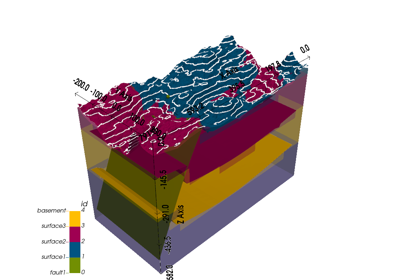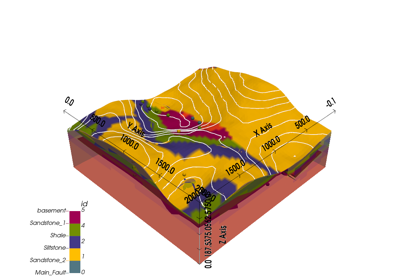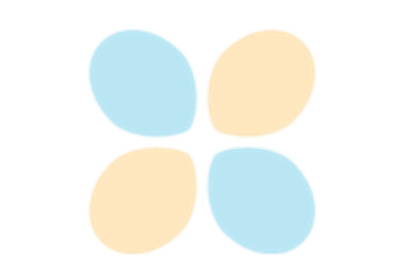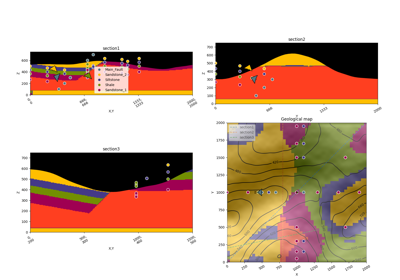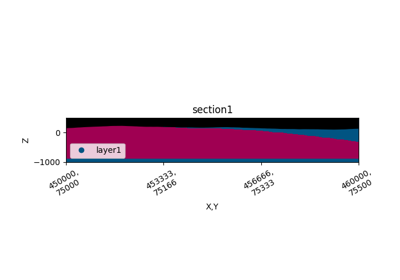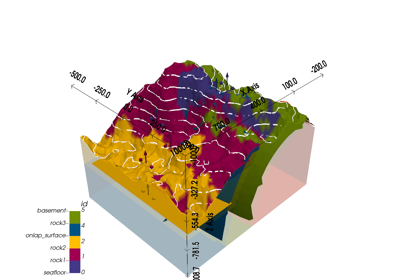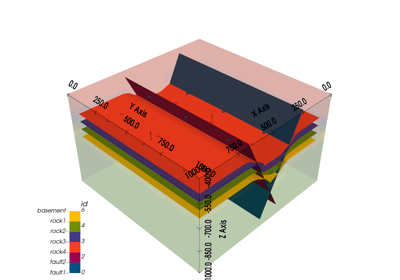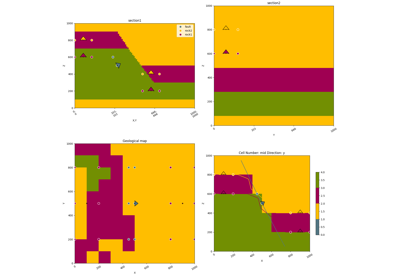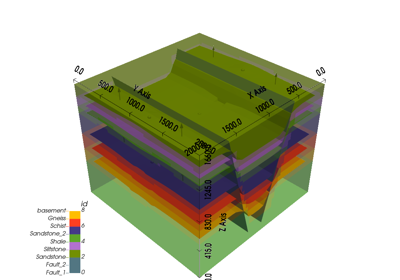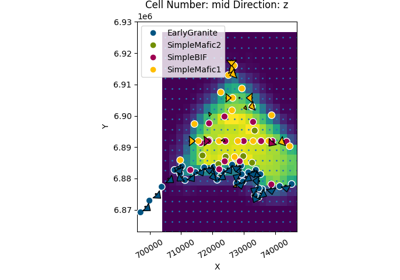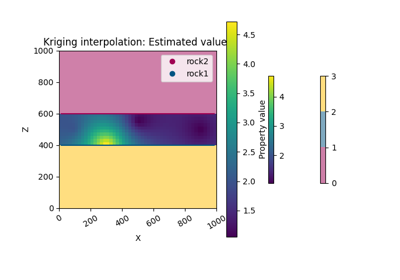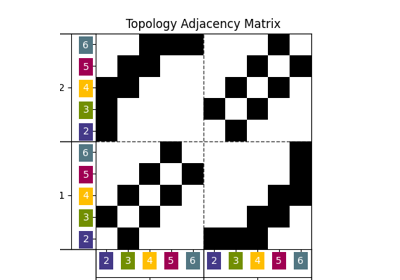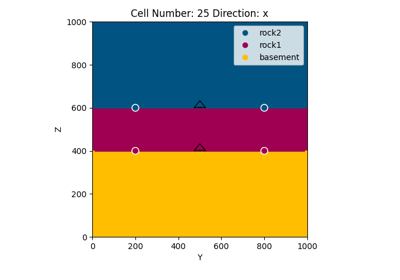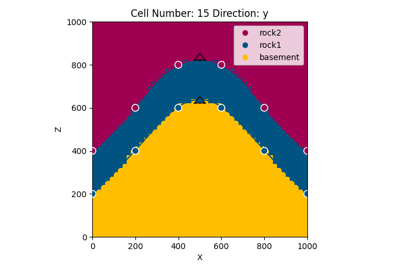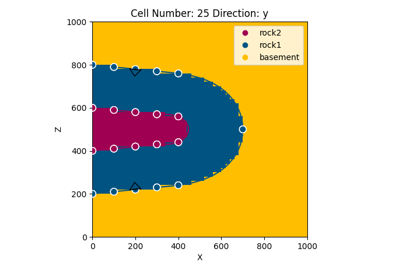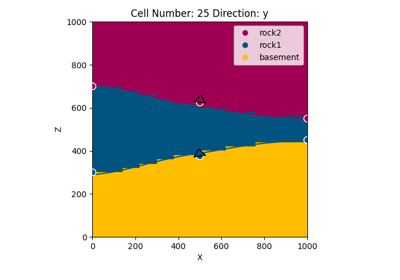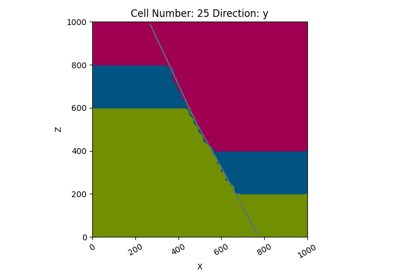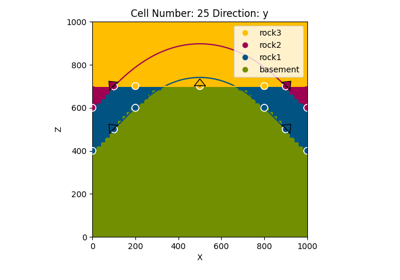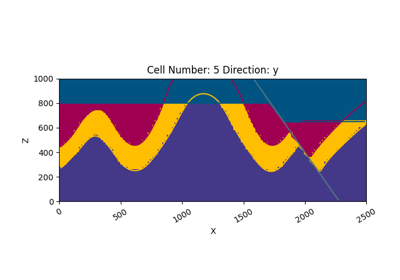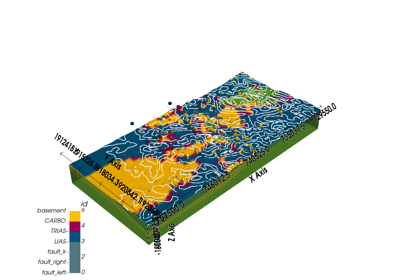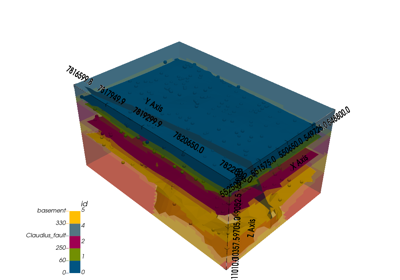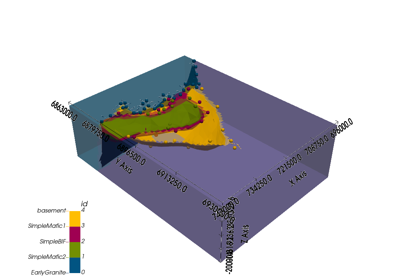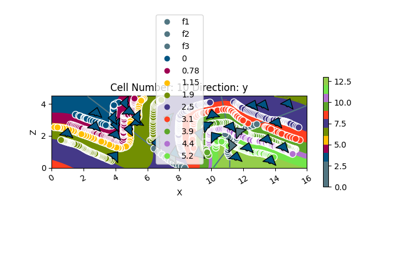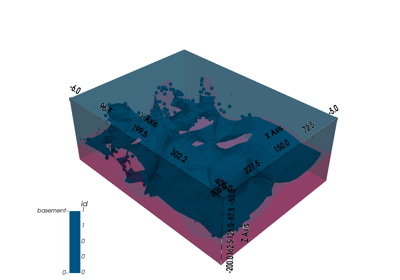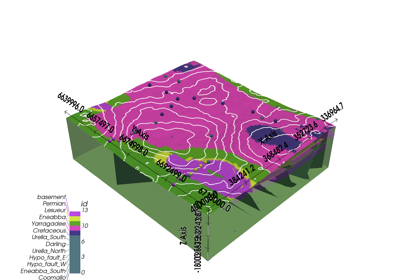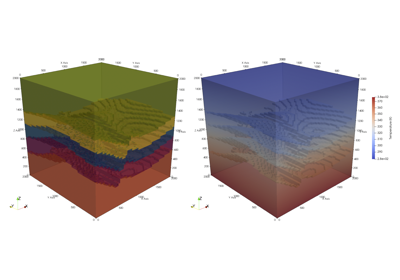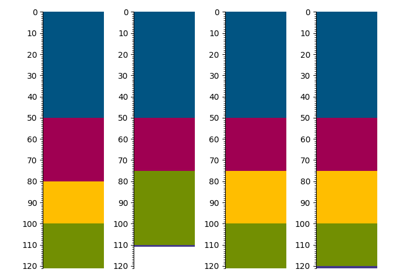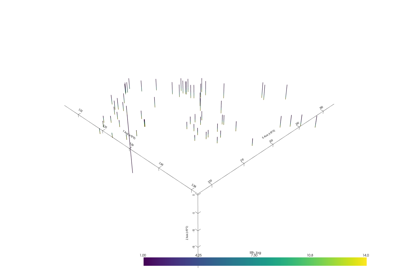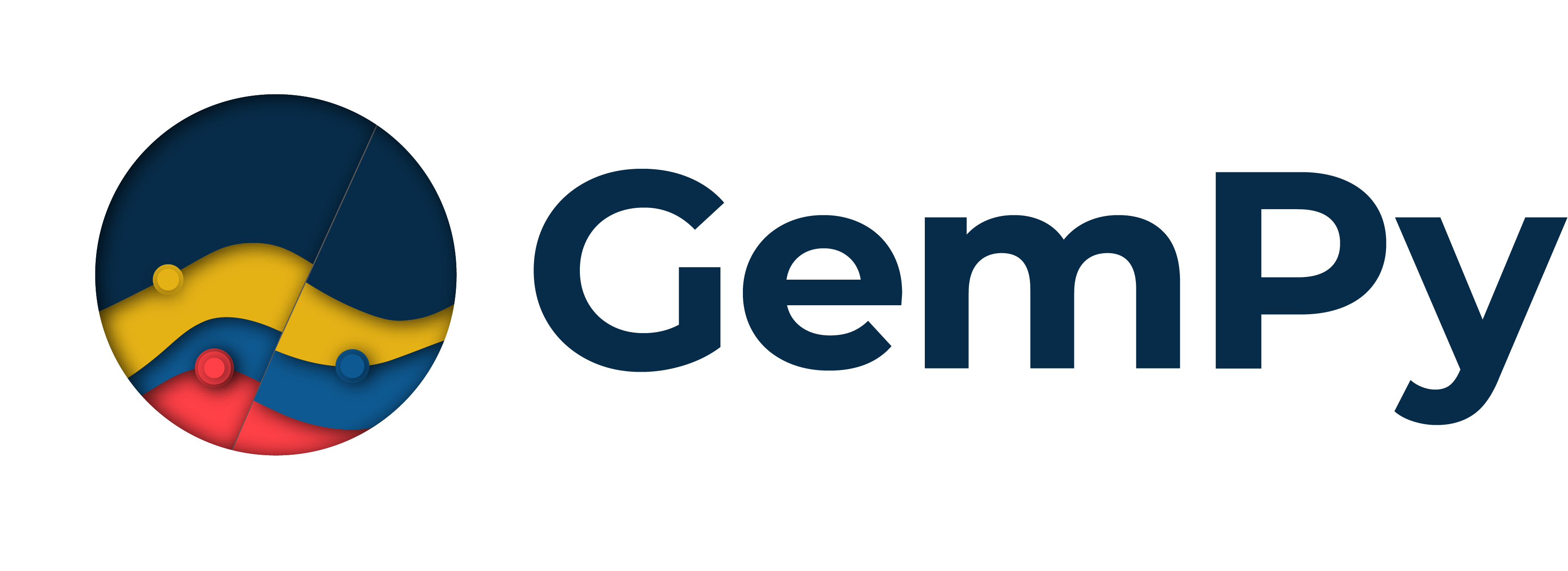gempy.core.model.Project¶
-
class
gempy.core.model.Project(project_name='default_project')[source]¶ Container class of all objects that constitute a GemPy model.
In addition the class provides all the methods you need to construct a geological model with
ImplicitCoKriging.See also
MetaData,ImplicitCoKrigingExamples using Project
Methods
__init__([project_name])Initialize self.
add_features(features_list[, reset_order_series])Add series, update the categories dependent on them and reset the flow control.
add_orientations(X, Y, Z, surface[, …])Add orientation.
add_series(series_list[, reset_order_series])Add series to the df
add_surface_points(X, Y, Z, surface[, idx, …])Add surface points.
add_surface_values(values_array[, …])Add values to be interpolated for each surfaces.
add_surfaces(surface_list[, update_df])Add surface to the df.
delete_features(indices[, …])Delete series, update the categories dependent on them and reset the flow control.
delete_orientations(idx)Delete orientation
delete_series(indices[, …])Delete series, update the categories dependent on them and reset the flow control.
delete_surface_points(idx)Delete surface points.
delete_surface_points_basement()Delete surface points belonging to the basement layer if any
delete_surface_values(properties_names)Delete a property or several properties column.
delete_surfaces(indices[, update_id, …])@TODO When implemeted activate geometric data, change remove data to False by default Delete a surface and update all related object.
get_active_grids()get_additional_data()get_data([itype, verbosity, numeric])Method to return the data stored in
panda.DataFramewithin agempy.core.model.Projectdata object.load_model_pickle(path)Read InputData object from python pickle.
map_geometric_data_df(d)Map a geometric data dataframe from the linked objects (at 07.2019 surfaces and series)
map_series_to_surfaces(*args, **kwargs)Map series to surfaces and update all related objects accordingly to the following arguments:
map_stack_to_surfaces([mapping_object, …])Map series to surfaces and update all related objects accordingly to the following arguments:
modify_kriging_parameters(attribute, value, …)Method to modify a given field
modify_options(attribute, value)Method to modify a given field
modify_order_features(new_value, idx)Modify order of the feature.
modify_order_series(new_value, idx)Replace to the new location the old series
modify_order_surfaces(new_value, idx[, …])Replace to the new location the old series
modify_orientations(idx, **kwargs)Allows modification of any of an orientation column at a given index.
modify_rescaling_parameters(attribute, value)Modify the parameters used to rescale data
modify_surface_points(indices[, …])Allows modification of the x,y and/or z-coordinates of an interface at specified dataframe index.
modify_surface_values(idx, properties_names, …)Method to modify values using loc of pandas.
new_model([name_project])Reset the model object.
read_data([source_i, source_o, add_basement])Read data from a csv, or directly supplied dataframes
rename_features(new_categories)Rename features and update the category dependent on them.
rename_series(new_categories)Rename features and update the category dependent on them.
rename_surfaces(to_replace, **kwargs)Replace values given in to_replace with value.
reorder_features(new_categories)Reorder series.
reorder_series(new_categories)Reorder series.
save_model([name, path, compress])Save model in new folder.
save_model_pickle([path])Short term model storage.
save_solution()set_active_grid(grid_name[, reset])Set active a given or several grids.
set_bottom_relation(series, bottom_relation)Set the bottom relation between the series and the one below.
set_centered_grid(centers, radius[, resolution])[s0] Initialize gravity grid.
set_custom_grid(custom_grid)Set custom grid, rescale gird and initialize theano solutions.
set_default_orientation(**kwargs)Set a default orientation if the df is empty.
set_default_surface_point(**kwargs)Set a default surface point if the df is empty.
set_default_surfaces()Set two default surfaces if the df is empty.
set_extent(extent)Set project extent
set_fault_object()Not implemented
set_fault_relation(rel_matrix)Method to set the df that offset a given sequence and therefore also another fault.
set_grid_object(grid[, update_model])Not implemented
set_is_fault([feature_fault, toggle, …])Set a feature to fault and update all dependent objects of the Model.
set_is_finite_fault([series_fault, toggle])Toggles given series’ finite fault property.
set_orientations(table, **kwargs)Set coordinates, surface and orientation data.
set_orientations_object(orientations[, …])set_regular_grid(extent, resolution)Set a regular grid, rescale data and initialize theano solutions.
set_section_grid(section_dict)[s0] Object that creates a grid of cross sections between two points.
set_series_object()Not implemented yet.
set_surface_order_from_solution()Order the surfaces respect the last computation.
set_surface_points(table, **kwargs)Set Set coordinates and surface columns on the df.
set_surface_points_object(surface_points[, …])Not Implemented
set_surface_values(values_array[, …])Set values to be interpolated for each surfaces.
set_surfaces_object()Not implemented yet.
set_theano_function(interpolator[, …])Pass a theano function and its correspondent graph from an Interpolator
set_theano_graph(interpolator[, …])Pass a theano graph of a Interpolator instance other than the Model compose
set_topography([source, set_mask])Create a topography grid and activate it.
update_additional_data([update_structure, …])update_from_grid()Update objects dependent from the grid.
update_from_series([reorder_series, …])Update all objects dependent on series.
update_from_surfaces([…])Update all objects dependt on surfaces.
update_structure([update_theano, …])Update python and theano structure parameters.
update_to_interpolator([reset])Update all shared parameters from the data objects
Attributes
additional_datagempy.core.data.AdditionalData[s0] Container class that encapsulateStructure,KrigingParameters,Optionsand rescaling parametersfaultsgempy.core.data_modules.stack.Faults[s0] Class that encapsulate faulting related content.gridgempy.core.data.Grid[s0] Class to generate grids.interpolatorgempy.core.interpolator.InterpolatorModel[s0] Child class ofInterpolatorwhich set the shared variables and compiles the theanograph to compute the geological model, i.e. lithologies.orientationsgempy.core.data_modules.geometric_data.Orientations[s0] Data child with specific methods to manipulate orientation data.rescalinggempy.core.data_modules.geometric_data.Rescaling[s0] Auxiliary class to rescale the coordinates between 0 and 1 to increase float stability.seriesClass that contains the functionality and attributes related to the series.
stackgempy.core.data_modules.stack.Stack[s0] Class that encapsulates all type of geological features.surface_pointsgempy.core.data_modules.geometric_data.SurfacePoints[s0] Data child with specific methods to manipulate interface data.surfacesgempy.core.data.Surfaces[s0] Class that contains the surfaces of the model and the values of each of them.-
__init__(project_name='default_project')[source]¶ Initialize self. See help(type(self)) for accurate signature.
-
save_model_pickle(path=False)[source]¶ Short term model storage. Object to a python pickle (serialization of python). Be aware that if the dependencies versions used to export and import the pickle differ it may give problems
- Parameters
path (str) – path where save the pickle
- Returns
True
-
static
load_model_pickle(path)[source]¶ Read InputData object from python pickle.
- Parameters
path (str) – path where save the pickle
- Returns
gempy.core.model.Model
-
save_model(name=None, path=None, compress=True)[source]¶ Save model in new folder. Input data is saved as csv files. Solutions, extent and resolutions are saved as npy.
-
read_data(source_i=None, source_o=None, add_basement=True, **kwargs)[source]¶ Read data from a csv, or directly supplied dataframes
- Parameters
source_i – Path to the data bases of surface_points. Default os.getcwd(), or direct pandas data frame
source_o – Path to the data bases of orientations. Default os.getcwd(), or direct pandas data frame
add_basement (bool) – if True add a basement surface. This wont be interpolated it just gives the values
the volume below the last surface. (for) –
- Keyword Arguments
update_surfaces (bool) – True
- Returns
True
- Return type
See also
gempy.core.data_modules.geometric_data.SurfacePoints.read_surface_points.gempy.core.data_modules.geometric_data.Orientations.read_orientations
-
get_data(itype='data', verbosity=0, numeric=False)[source]¶ Method to return the data stored in
panda.DataFramewithin agempy.core.model.Projectdata object.- Parameters
itype (str{'all', 'surface_points', 'orientations', 'surfaces', 'series', 'faults', 'faults_relations','additional data'}) – input data type to be retrieved.
numeric (bool) – Return only the numerical values of the dataframe. This is much lighter database for storing traces
verbosity (int) – Number of properties shown
- Returns
Data Object df.
- Return type
-
